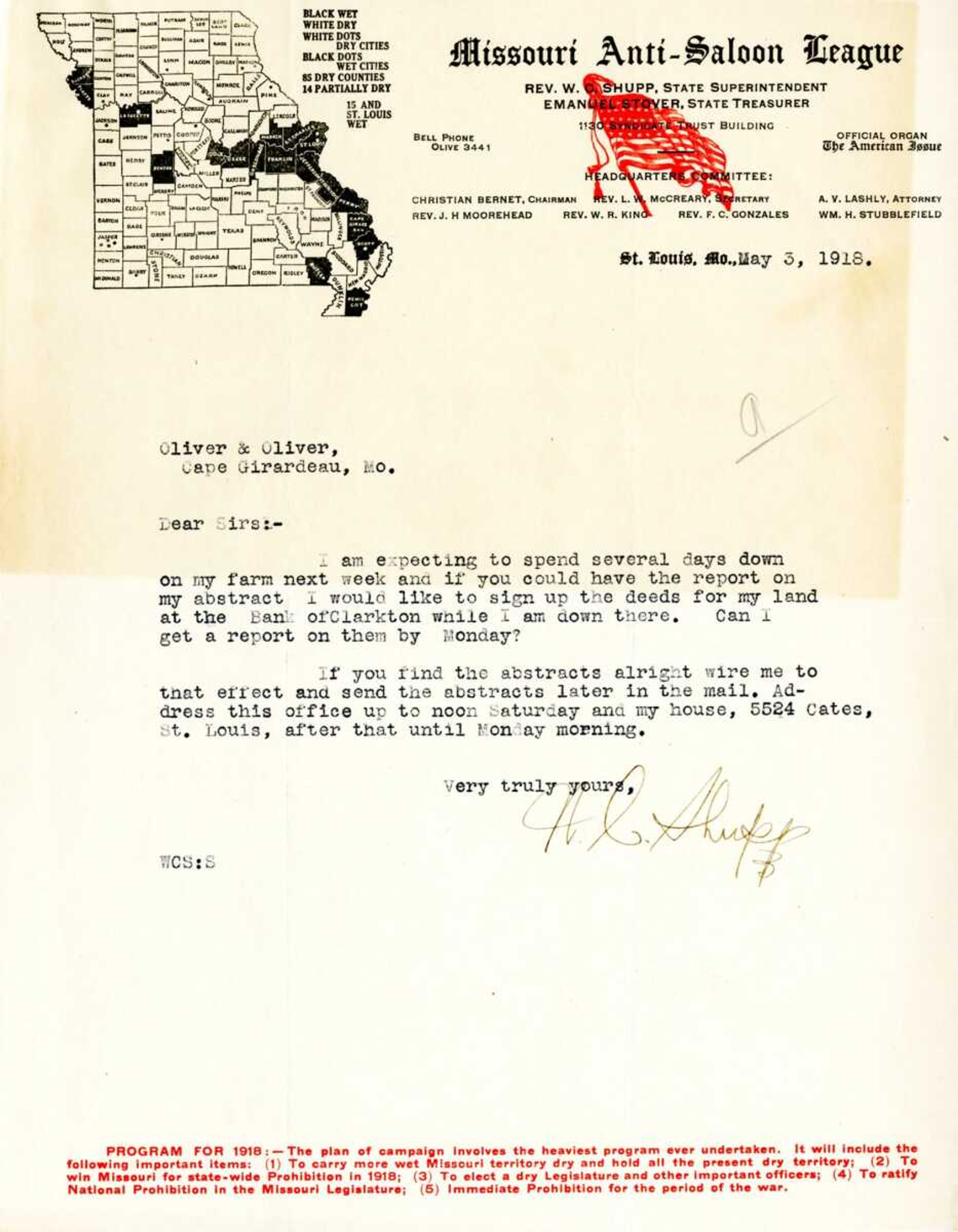Anti-Saloon League of Missouri
The Anti-Saloon League of America was founded in Ohio in 1895. The organization quickly spread nationally. The purpose of the group was to end the sale and distribution of liquor in the United States. State chapters popped up throughout the nation. Missouri's chapter was organized in 1890. ...
The Anti-Saloon League of America was founded in Ohio in 1895. The organization quickly spread nationally. The purpose of the group was to end the sale and distribution of liquor in the United States.
State chapters popped up throughout the nation. Missouri's chapter was organized in 1890. In 1913, the Rev. Wilbert C. Shupp became the state superintendent of the Missouri Anti-Saloon League. Missouri, through Shupp's leadership, successfully made the majority of the state's counties dry. Only 15 were "wet" in 1918. These included Cape Girardeau, Perry, Scott, Butler and Pemiscot counties in Southeast Missouri. Shupp and others before him failed to appeal to voters for a statewide prohibition of liquor. Voters rejected implementation of these laws in 1910, 1912 and 1918.
Cape Girardeau attorney Robert B. Oliver advocated for prohibition across Missouri. He co-signed a resolution that was published in the St. Louis Star and Times condemning the St. Louis Business Men's League and Bankers' Association resolution that supported alcohol consumption in Missouri. Lecturer Eugene A. Vogt wrote to Oliver in December 1916 stating that he [Vogt] had previously advocated for keeping the country "wet," but recently had changed his mind to advocate for the removal of alcohol. Oliver wrote back commending Vogt on his recognition of the error of his ways and supported his efforts "to the elimination of this great curse from our land." Oliver fully believed that successful "agitation and publicity will drive this evil from the state."
Temperance and prohibition lobbies like the Anti-Saloon League successfully lobbied Congress's passage and ratification of the 18th Amendment to the Constitution. The amendment prohibiting the sale and manufacturing of liquor throughout the United States was passed on Dec. 18, 1917, and ratified two years later. During the brief time that this amendment was in effect, the Anti-Saloon League of Missouri attempted to solidify its hold on keeping Missouri a dry state, through the ballot box. It would put forth or support candidates for various offices because they were supportive of keeping alcohol from crossing the state's borders. The League was adamantly opposed to any candidates who supported Missouri becoming "wet"."
In February 1926, Oliver wrote to Superintendent Rev. Abe C. Jones of the Southeast Missouri District of the Anti-Saloon League of Missouri. He contributed $5 to support the organization, but also to criticized the lack of political influence in failing to stop the appointment of "recognized and known liquor men, or else liquor sympathizers in the enforcement of prohibition." Oliver wrote further that the new prohibition law had never been tested in his area of the state since most of the political appointees in the area were ex-saloon men. Oliver felt that United States Senators George H. Williams and James A. Reed's support of "wet" appointees was detrimental to the successful implementation of the prohibition amendment in Missouri.
The 21st Amendment to the United States Constitution repealed the prohibition amendment in 1933.
Connect with the Southeast Missourian Newsroom:
For corrections to this story or other insights for the editor, click here. To submit a letter to the editor, click here. To learn about the Southeast Missourian’s AI Policy, click here.










